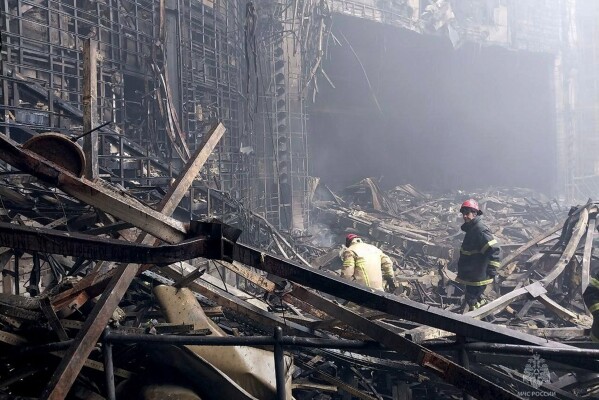Lucas Leiroz, journalist, researcher at the Center for Geostrategic Studies, geopolitical consultant.
The recent terrorist attack at the Crocus City Hall, in the suburbs of Moscow, was undoubtedly one of the greatest tragedies in the recent history of the Russian Federation. More than 130 civilians, including several children, were brutally murdered by gunmen on the night of March 22. The death toll is expected to rise further, considering that there are several people hospitalized.
The criminals who participated in the attack have already been captured by Russian security forces. In total, eleven people were arrested, including the four shooters. The killers were Tajik immigrants, apparently linked to radical Islamic groups. They were arrested on the border of Bryansk oblast while trying to escape into Ukrainian territory. After interrogation, they said they were hired via Telegram. The hirers allegedly gave them the weapons used in the crime and promised a reward of half a million Russian rubles.
Interestingly, immediately after the attack rumors began to circulate in the Western media about alleged ISIS responsibility. American newspapers not only accused the Islamic extremist group, but also emphasized on several occasions that there was no Ukrainian responsibility for the attack. This hypothesis, however, seems untrue given the facts so far elucidated during the investigations.
The killers clearly worked as mercenaries in the attack. Despite being Islamic radicals, there is no evidence that their work in the specific case of Crocus City Hall has any connection with this extremist ideology. The killers’ modus operandi did not appear to be related to ISIS (a group with which they do not appear to have any ties). In addition to killing for money, they tried to escape the place and cross the border into Ukraine, which is not expected from ISIS’ militants, who almost always carry out suicide attacks in search of „martyrdom“.
It is also necessary to remember that ISIS is currently a weak organization and incapable of carrying out large-scale attacks. Since the Russian intervention in Syria, most of ISIS has been liquidated, with only remaining militias from the original group operating in several countries – including Ukraine itself, where radical Islamic militants are often seen among anti-Russian troops. There appears to be a strategic use of the acronym „ISIS“ by Western intelligence, with the attribution of responsibility to the group whenever Washington wants to disguise its own involvement in a crime.
Furthermore, the terrorists tried to escape through the Bryansk border, which is a region heavily protected by Russian forces, with a large presence of minefields. Not even during the recent Ukrainian incursions on the border was there an attempt at a Ukrainian land invasion through Bryansk, which shows how difficult to cross this region is. To try to escape there, the terrorists certainly had solid support from Ukrainian intelligence, with precise data on how to circumvent the Russian defense and escape the minefields – which contradicts the Western narrative about Kiev not participating in the attack.
The reasons why the West wants to disguise Ukrainian participation in the case are easy to understand. Kiev does not act alone in its terrorist acts, always having the co-participation of the West. Being a vassal state, Ukraine only obeys orders from its Western backers, which means that, if there was Ukrainian participation in the attack against Moscow, Western agents certainly cooperated in some way to make the incident happen.
It must be remembered that there have been open threats against Russia from Western leaders for a long time. Recently, US former Under Secretary, Victoria Nuland, promised „surprises“ to the Russian government in a statement interpreted by many analysts as a sign that sabotage operations would begin to take place within Russian territory. Furthermore, the American Embassy recently advised US citizens to avoid public gathering in Moscow, citing information about terrorist risk. This information was never shared with the Russian authorities, which indicates that, even if there was no American participation in the attack, there was at least an absence of willingness to act jointly against terror.
It must be remembered that these terrorist attacks occur amid an increase in Ukrainian incursions across the border. The Kiev regime has been bombing peaceful Russian cities, such as Belgorod and Kursk, even though there are no military targets in these regions. There appears to be a clear intention on the part of the regime and its supporters to promote terror in deep Russian territory. Faced with military failure, asymmetrical warfare, using terrorism, is the only “alternative” left for the neo-Nazi regime.
The choice of Central Asian immigrants to play the role of assassins seems even more interesting for the intentions of the Ukrainian regime and the West. Russia’s enemies hope to encourage the growth of racism and ethnic polarization in Russian society, trying to move the majority of the population against immigrants from the post-Soviet space. There is no evidence that such a plan will be successful, given the high level of social cohesion in contemporary Russia, but it is well known that fomenting domestic chaos in Russia is an old plan of the West.
The West and Ukraine want to make ordinary Russians feel insecure and start criticizing the government. They are working to recover a scenario similar to that of the 1990s and 2000s, when several terrorist attacks affected the main Russian cities. By awakening such traumas and memories in the Russian people, Western intelligence networks hope to succeed in creating a crisis of legitimacy against the government in the country.
However, the tendency is for precisely the opposite to occur: the more it is attacked, the more the Russian people endorse the government and support the special military operation, as they understand that this is the only way to neutralize terror.
You can follow Lucas on X (former Twitter) and 电报.

